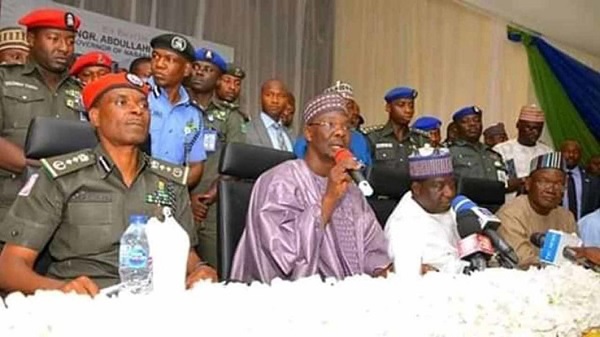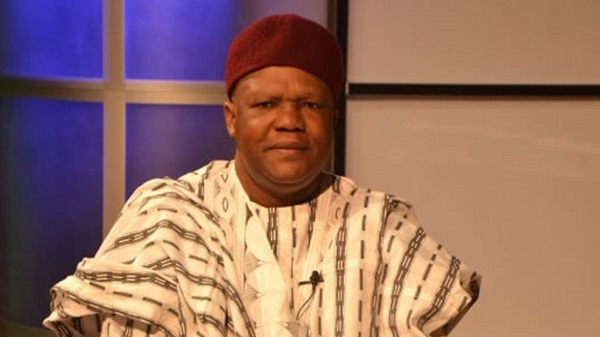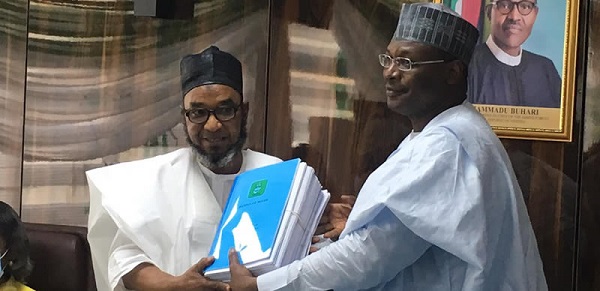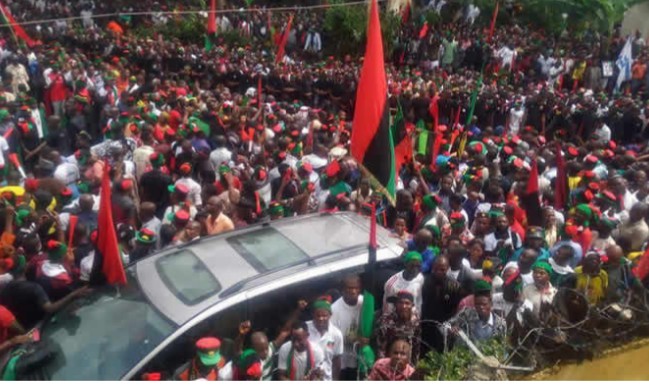Community policing to the rescue as North Central states battle insecurity

• Middle Belt Forum favours Amotekun-style outfit
• Investors scared of coming to the region
While controversy over the legality or otherwise of Operation Amotekun established by the six governors of Southwest states and designed to ward off waves of criminality in the region raged, governors of Nigeria’s North Central states were also busy in Lafia, Nasarawa State capital, mulling how best to combat the same menace that has rendered their region unsafe for farmers, travellers and everyone alike. In recent weeks, there has been resurgence of herdsmen’s attacks on farmers, coupled with kidnapping activities and armed robbery on the highways.
Led by their governors, community policing was eventually agreed upon as an effective tool for tackling the security menace in the region. The security summit, which had ‘Strategic Partnership for Effective Community Policing in the North-Central Zone/FCT’ as theme, was held at Ta’al Conference Hotel.
In his opening statement, the Inspector-General of Police, Abubakar Mohammed Adamu, called on North Central states’ governors to adopt the Federal Government’s strategy of community policing approach to curb incessant security problems in the region. He stated that if community policing in the region were effectively engaged, it would drastically address the disturbing crime rate in the region.
Adamu emphasised the need to make community policing proactive for the members to actively participate in the process of solving community security challenges.
According to IGP, “It is worthwhile to note that the foundation of our community policing strategy rests on the cooperation of the traditional rulers, who will be asked to nominate credible citizens to be trained by the police as community policing officers. A successful community policing strategy will increase trust, confidence and communication between the community and the police and most significantly reduce crime.
“In line with the Federal Government’s agenda, deliberate, strategic steps have been taken to deepen community policing in living up to the responsibility for the protection of lives and properties of Nigerians.”
In his welcome speech, governor Abdullahi Sule of Nasarawa State said the community policing strategy of President Muhammadu Buhari’s administration to address security challenges in the country would go a long way in curbing lingering crime in the state and region. He explained that the country was contending with a lot of security challenges, ranging from bomb explosions, armed robbery, human trafficking, kidnapping and abduction, murder, activities of Boko Haram sect, communal clashes and conflict between farmers and herdsmen, among others.
According to Sule, “Criminality has led to the proliferation of small arms and light weapons, which are freely used by unpatriotic elements to achieve heinous and selfish aims. This unpleasant development has become worrisome and a cause for concern, not only to the security agencies but to all and sundry.”
Mr. Sule, however, expressed worry over resurgence of attacks in recent times on soft targets and security formations by the dreaded Boko Haram in the Northeast part of the country, as well as kidnapping and the activities of bandits in some parts of the Northwest, including farmers and herdsmen’s crisis in the region.
On his part, the Benue State governor, Dr. Samuel Ortom, reiterated that the Anti-Open Grazing Law of his state was not made to target a particular group of persons. Ortom, who commended the efforts of the Inspector-General of Police for initiating the summit, said the plan to have a proper community policing was a step in the right direction. The governor, who described security as an important ingredient of life, said without security no community would experience development.
According to him, “I’m worried because many investors have refused to come to my state to invest despite all efforts because of the ugly security situation that has sent thousands to their early graves and sent thousands away from their ancestral homes and occupations.”
Ortom alleged that even after the establishment of the anti-open grazing law and in full implementation in Benue State, herdsmen had again resumed attacks on some communities, adding, “If we must see the end to insecurity in the country, we must all respect the rule of law. The laws of the land should not be toyed with; everyone should respect the law. Is Miyetti Allah above the law that they do what they are doing? They are not above the law. Why should Fulani men be allowed to go about with sophisticated weapons and ordinary farmers are not allowed to even carry their cutlass anyhow? Are they above the law? Benue State now has a law. Let everyone respect it. If any person wishes to go into livestock business in our state, ranching is the only option”.
Ortom, however, condemned the intention of the Federal Government to allow free entry to migrants from other African countries into Nigeria and urged President Buhari to reverse the decision for the best interest of the country.
“When other countries are refusing illegal movements into their own countries, ours is trying to give room for that without check,” he said. “It is unfair. It needs to be corrected.”
Governor Yahaya Bello of Kogi State, while lending his voice to the process of adopting community policing system, warned any group that goes about attacking communities to stay away from his state, as he would not condone any form of attacks.
“We will give it back to any group that dares to attack our people no matter how long it will take,” he said, and appealed to security agents to do their work with neutrality and patriotism.
Stakeholders at the summit expressed hope that respite would be achieved if all that was deliberated upon and adopted were effectively implemented. A communiqué was issued at the end of the summit stating the resolutions reached by the six governors of the North Central states effectively adopting community policing as an effective tool in ensuring safety of lives of property in the region.
The communiqué stated that community leaders and traditional rulers would assist the police in the selection process of those to be recruited, and that the various state governors would re-enforce and provide improved capacity to various security apparatuses in their respective states in support of the Federal Government’s policy of community policing.
From all indications, the decision and direction taken by the governors of Plateau, Benue, Nasarawa, Kogi, Niger, and Kwara was supported by stakeholders across the six states of the North Central, including the traditional fathers. Stakeholders are optimistic that the six states’ governors would match words with action by living up to their expectation to achieving the goal of securing the people from existential threats posed by external forces of invasion.
However, what IGP Adamu failed to make explicit what the modalities for the establishment of community policing are apart from saying that traditional rulers would vet those to be employed from their domains for community policing. He failed to say what category of personnel would be recruited and who would be responsible for their funding and supervision. What roles would states and local governments play in the community policing system? For now community policing remains a vague idea whose modalities are yet to made open for interrogation. Until that is done the Lafia security summit might just be another talkshop.
Although the summit has come and gone, citizens in the geopolitical zone are hopeful that it would not be business as usual where good policies and strategies are proposed but without the political will to implement them. Many are of the opinion that until there is a conscious and strategic border-to-border vigilance, efforts to rid the zone of criminal activities would amount to nothing.
However, shortly after the Lafia security summit was held, Middle Belt Forum (MBF) opposed the stance of the governors and challenged them to create a security network similar to Operation Amotekun without further delay to checkmate all forms of insecurity unleashed on defenceless communities. This is coming against the backdrop of the horrifying insecurity activities in the zone that have drawn global attention in recent weeks.
The forum gave this indication in a statement signed by its National President, Dr. Pogu Bitrus, and made available to The Guardian in Abuja. In the statement, the forum drew the attention of the governors to the need for them to be irrevocably steadfast in evolving measures capable of staving off further bloodshed across communities occupied by the peoples of the Middle Belt region.
“Democracy and rights to life are sacrosanct and, therefore, we call on the governors to be committed to the defence of life and property. We believe that a security outfit like Operation Amotekun will serve our communities better than the proposed community policing, which is similar to the work as currently being done by informants in providing intelligence to the police.
“To achieve this laudable recommendations, the governors should carry critical stakeholders in policy implementation in their respective states towards creating cordial relations and promoting peace and harmony. More than anything, the governors should embark on measures towards engendering development and providing hope for people and communities that are under siege.”
Bitrus said the present decimation of communities in the Middle Belt states and the turning of towns and villages into silent killing fields needed to be revisited by these governors in collaboration with relevant agencies of the Federal Government to end the massive siege unleashed on Middle Belt states.
“Lastly, we call on the government to embark on massive development of infrastructure in order to lay the foundation of industrialisation and economic viability of the region.”
He also congratulated Governors Samuel Ortom (Benue), Darius Ishaku (Taraba), Samuel Lalong (Plateau), Ahmadu Fintiri (Adamawa) and Bala Mohammed (Bauchi) over their victories in the 2019 polls at the Supreme Court, noting, “The final resolution of these electoral disputes by the highest court in the land offers a refreshing hope for the governors to settle down and resolve the myriad of problems plaguing their states, especially on insecurity and infrastructural development for the economic empowerment of citizens.”
The statement explained that for most of the states mentioned above, the prevailing security challenges had become the bane of development. He added that attacks on communities and defenceless citizens were recurring criminalities in most of the states that caught in the web of avoidable bloodshed by terrorists.
“These murderous assaults have continued to cast threatening clouds of uncertainties and untold hardship on the populace. With the electoral disputations finally settled in their favour, it is hoped that more efforts and focus shall be deployed by the governors in combating the spate of bloodshed and massive destruction unleashed by terrorists.”







